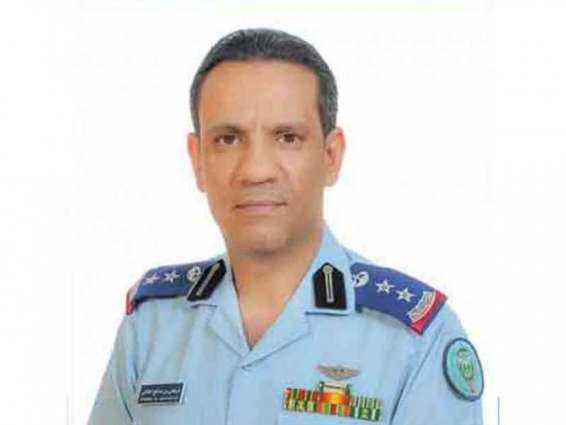RIYADH, (Pakistan Point News - 19th Jun, 2018) Spokesman of the Arab Coalition for the Support of Legitimacy in Yemen Colonel Turki Al-Malki confirmed that the military operations carried out by the Yemeni army and resistance forces supported by the command of the coalition forces continue to achieve successes and victories on many fronts inside Yemen and witness great and continued progress in a synchronous and thoughtful way, in various axes and sites in Hodeidah, Saada, Midi, Hajjah and Nahm.
He said these operations contributed to the imposition of control on these fronts, referring to the heavy losses suffered by the Iran-backed Houthi terrorist coup militia, which made them unable to withstand, or deal with this very critical situation.
Al-Maliki said during a conference held at the Armed Forces Officers Club in Riyadh, in a letter from the command of the coalition forces to the Yemeni people, that the Yemeni citizen should be alerted to lies propagated by the Iran-backed sectarian terrorist militia, and its claim that it controls the military position, with the aim of intimidation and misleading to enroll them in their ranks, which promotes abhorrent sectarianism that will give the Yemenis only division and the loss of all what is national.
''The chaotic militia is dying, and in its worst condition,'' he said as quoted by Saudi Press Agency, SPA. He stressed that security and the return of life to the Yemeni street require determination, resolve and determination to stand behind the legitimate Yemeni government, which is making great efforts to restore the Yemeni territories.
On the progress achieved by the coalition forces and the Yemeni army and the resistance forces in both Hodeidah and Saada, the spokesman of the coalition forces said that the control of Hodeidah airport is very imminent, especially after the control of the main ways of the city, stressing that the port of Hodeidah is a strategic military target through which these terrorist militias receive the weapons provided to them from Iran to deliberately provoke chaos and corruption in Yemen, and continue tampering through the acts of terrorism and threatening maritime navigation in the Straits of Bab al-Mandab.
Colonel al-Malki referred to the process and the political efforts in Yemen, the most recent of which was the visit of UN Special Envoy for Yemen Martin Griffith to Yemen in early June, during which he met with the Yemeni President Abd Rabbo Mansour Hadi and some representatives of the countries of the region, before moving to Sana'a. His efforts and various initiatives within the general framework for finding a political solution in Yemen were rejected by the Houthi militias, which is similar to the efforts of the former UN envoy Ismail Ould Sheikh Ahmed, which were unable to find a solution to the Yemeni crisis because of the rejection of Huthi militias and lack of care or interest in finding solutions on the ground to get out of the Yemeni crisis, by prioritizing the interest of the Yemeni people.
During the press conference, Colonel al-Maliki reviewed the efforts of the Coalition Forces in terms of securing the work of the international and international humanitarian organisations in all Yemeni territories, protecting the roads and corridors of the comprehensive humanitarian operations plan in Yemen and granting permits for relief and humanitarian aid through land, air and sea, which last week included 65 flights, carried more than 4,000 passengers, 41 permits for ships anchored in all Yemeni ports, and one for the shipment of aid arriving by road.
He pointed out that the assistance coming to Yemen included oil derivatives and therapeutic, food and shelter services.
On the military operations on the border strip adjacent to the southern border of Saudi Arabia, Maliki pointed out that the coalition forces secured many sites and large areas on this border, and completely cleared them of the failed attempts by the Houthis to infiltrate the borders of Saudi Arabia. ''These attempts have always been met with a severe deterrence through firm and determined targeting through many military methods, which depend sophisticated surveillance systems, including Apache fighters,'' he added.




